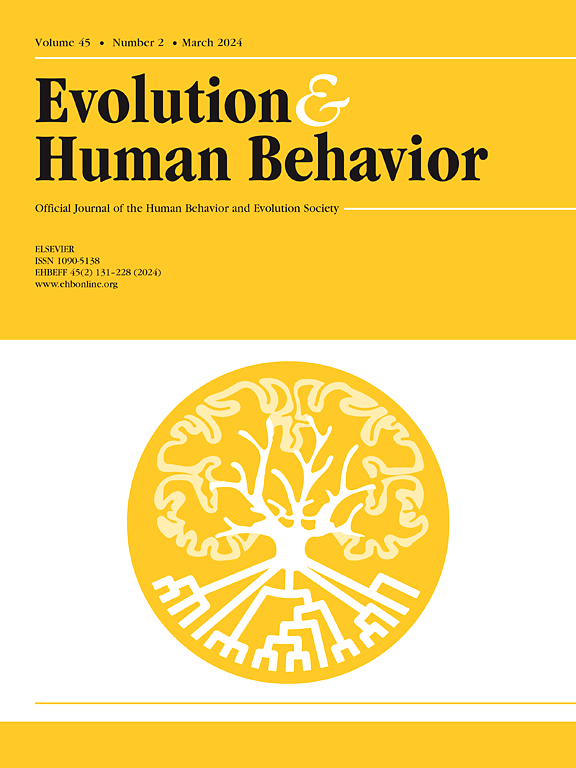Interpersonal leverage: Individual differences in the endorsement of anger and gratitude
IF 3.2
1区 心理学
Q1 BEHAVIORAL SCIENCES
引用次数: 0
Abstract
Social emotions such an anger and gratitude evolved to help people navigate the adaptive problems posed by social interactions. Building on the logic of the recalibrational theory of anger, we argue that a systematically inverted relationship exists between the triggering conditions, inputs, outputs, and consequences of anger and gratitude, and we introduce the novel hypothesis that this inverted relationship between anger and gratitude extends to the individual difference characteristics that modulate the proneness of individuals to endorse and express each emotion. Where Sell, Tooby, and Cosmides (2009) found evidence that physical strength in men and attractiveness in women—two ancestrally valid dimensions of social leverage—predict greater proneness to anger, we suggest that these same dimensions of social leverage negatively predict proneness to gratitude. We report three studies (N's of 417, 309, and 728 adults, respectively, all recruited from MTurk) that collectively address three goals related to the above reasoning: 1) to replicate the findings of Sell et al. (2009) concerning strength and attractiveness as sex-differentiated predictors of proneness to anger; 2) to develop and validate a novel measure of interpersonal gratitude, based on Sell et al.'s (2009) measures of anger; and 3) to test the hypothesis that physical strength in men and attractiveness in women correlate negatively with proneness to gratitude. Results provide new support for Sell et al.'s finding that strength in men, and attractiveness in women, predict proneness to anger, but contrary to Sell et al. (2009) indicate that physical strength also predicts proneness to anger in women. Regarding gratitude, we find that physical strength in men and attractiveness in women correlate as expected with some but not all dimensions of proneness to gratitude.
人际杠杆作用:愤怒和感激认同的个体差异
像愤怒和感激这样的社会情感是为了帮助人们应对社会互动带来的适应性问题而进化的。基于愤怒再校准理论的逻辑,我们认为在愤怒和感激的触发条件、输入、输出和后果之间存在着系统的反向关系,并且我们引入了新的假设,即愤怒和感激之间的这种反向关系延伸到调节个体支持和表达每种情绪的倾向的个体差异特征。塞尔、托比和科斯米德斯(2009)发现,男性的体力和女性的吸引力——社会杠杆的两个古老有效维度——预示着更大的愤怒倾向,而我们认为,这些相同的社会杠杆维度消极地预示着感恩倾向。我们报告了三项研究(分别涉及417、309和728名成年人,均来自MTurk),它们共同解决了与上述推理相关的三个目标:1)重复Sell等人(2009)关于力量和吸引力作为性别差异的愤怒倾向预测因素的研究结果;2)基于Sell等人(2009)的愤怒测量方法,开发并验证一种新的人际感恩测量方法;3)检验男性的体力和女性的吸引力与感恩倾向负相关的假设。结果为Sell等人的发现提供了新的支持,即男性的力量和女性的吸引力可以预测愤怒的倾向,但与Sell等人(2009)相反的是,体力也可以预测女性的愤怒倾向。关于感恩,我们发现男性的体力和女性的吸引力与感恩倾向的某些方面(但不是所有方面)如预期的那样相关。
本文章由计算机程序翻译,如有差异,请以英文原文为准。
求助全文
约1分钟内获得全文
求助全文
来源期刊

Evolution and Human Behavior
生物-行为科学
CiteScore
8.30
自引率
9.80%
发文量
62
审稿时长
82 days
期刊介绍:
Evolution and Human Behavior is an interdisciplinary journal, presenting research reports and theory in which evolutionary perspectives are brought to bear on the study of human behavior. It is primarily a scientific journal, but submissions from scholars in the humanities are also encouraged. Papers reporting on theoretical and empirical work on other species will be welcome if their relevance to the human animal is apparent.
 求助内容:
求助内容: 应助结果提醒方式:
应助结果提醒方式:


